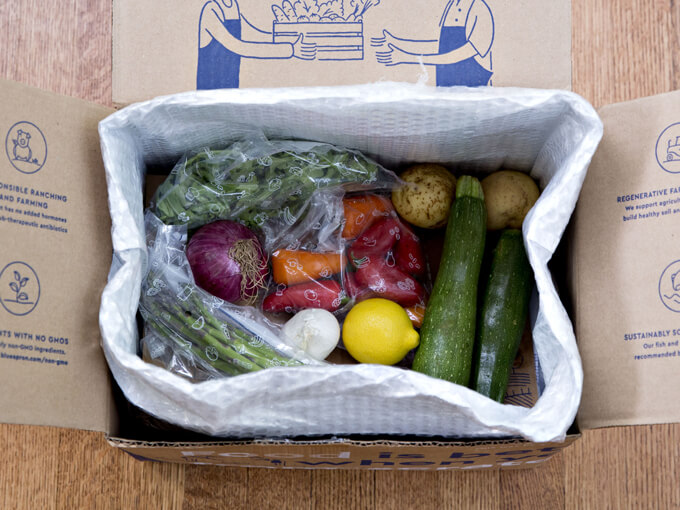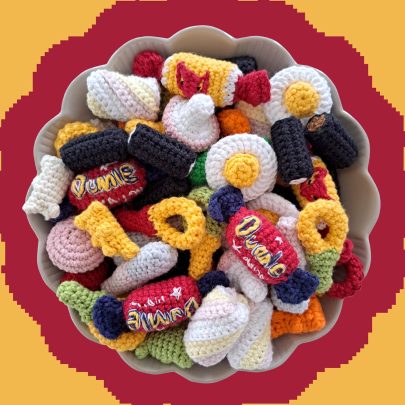Aug 15, 2019 Food
Joe Nunweek signs up for a meal kit delivery service and it makes him feel a bit dead inside.
Somewhere below the willowy spon-con influencer, somewhere above the first year KPMG grad teaching himself to cook in a beige Parnell townhouse – that’s where you’ll find me in the hierarchy of domestic gods and goddesses. I’m finally eating from Hello Fresh, or my Food Bag, or Marley Spoon, or whichever your preferred brand of planned and exactingly packaged weeknight meal is. I got a free trial I had to put my debit card details in for. Suckers, I thought, I’m going to cancel this as soon as my first box of meals arrives. By the time I sat down to sort myself out for the week, I’d already been billed for the second box.
The cognitive dissonance is overwhelming. I’ve always mistrusted these meal boxes and their streamlined, insidious convenience. I’ve always found the process of cooking for oneself and for others to be a kind of oasis in the day or week, a nourishing and practical task that’s as involved or straightforward as you want to make it. The process of slapping something new together on a weeknight or for something like pot luck always has a frisson of imagination, curiosity and surprise, and it’s one I worry that the meal kits winnow away. Like a Cup of Soup for those of us who have moved on to solids, what you see is all you get.
Yet I’m also a simpleton who gets excited by free things. One had to prevail, and it was the free stuff. But I’m not entirely happy about it.
First of all, the packaging, seemingly modest, actually turns out to be mortifyingly wasteful. The brown paper bag each meal comes in conjures up a sort of Depression-era thrift, before countless tiny little plastic bags (chilli flakes, sesame seeds, crushed nuts, dry cheddar cheese) fall out and begin to fill spare shelf and sill space in the kitchen. There is too much to put in the prescribed meals, yet too little to ever use anywhere else. A solitary spare garlic clove rattles at the bottom of each set of ingredients, and it feels like someone rebellious at HQ slipped it in there, desperate for one of the budding non-autonomous chefs of inner suburbia to live a little in terms of flavour.
I ignore it. It is extraneous to the instructions. I follow each photo and line of instruction with meticulous order. “TIP: Finely chopping the veggie helps them to cook in the allocated time”, one recipe instructs me. Part of me recalls already knowing this, insists that I couldn’t have just been sticking an intact onion on the pan this whole time and watching it char. Instead, I chop finer. I am the programmatic hog now, the boy swine trained to assemble the makings of his own trough.
As I eat these meals, what exactly is it that’s eating at me? True, the mealbaggers aren’t the most juvenile product on the market. Unlike completing an adult colouring book or choosing to travel by Lime scooter, you have to eat sometime. They’re not flagrantly and disruptively evil like Amazon or Uber, and a couple of the good ones try to function as social enterprises. The target market (me) isn’t being fleeced or taken advantage of, which is more than you can say for the nation’s small army of mobile loan trucks and sharks.
What gets to me is the overarching sense of ‘giving up’ that the nightly recipe and bags represent. When viewed objectively, the service is clearing two pretty modest obstacles in my path. One is having to go to the shops, whether I plan it out on the weekend or wing it after work. The other, more diffuse, is a kind of decision paralysis. Work is tiring and stressful, and deciding what to cook might involve some form of mental energy, lateral thinking about what you need and where, and a yum opportunity cost foregone.
I can just about excuse my own slackjawed and passive cultural consumption, the bored “that’s good enough” use of music and television streaming services. But I’m in a privileged position where I have some agency in what I’m going to make myself for literal dinner and how, and I hold a residual sense that this process remains intrinsically special.
For the meal kit’s consumer base, exercising that agency – deciding what you’ll make, thinking ahead just enough to get to the shops on the way home – is not particularly hard. Arguing otherwise buys into the 21st century cult/martyrdom of busy-ness, and I’d submit that for straight men especially, it rewards a gendered “can’t someone else make the decision?” malaise when it comes to domestic tasks. Like our identical Mac DeMarco-soundalike playlists (“based on your tastes”), the bags are our illusion of taking charge, even if that involves abdicating the cognitive work of exerting control on your environment, treating active choice as a mere inconvenience.
What do we lose when we decide to give up following our impulses to hunt down and understand what we like and why? If it sounds trite, it’s cos it’s true: learning the story behind the food gives it a lot more flavour, lending it both social and political dimensions. Reading an Ottolenghi book and having a crack at adapting something out of it isn’t novel by any means, but the context is enriching. Those countless wonderful Anthony Bourdain shows where he’d go meet new people and eat with them are the same thing – a unity of food, place, history and geography.
It doesn’t have to be celeb chef worship either. One of my fondest memories is of living overseas for the first time in my early twenties. I’d been feeling jaded and demoralised by my rotation of pastas and stir-fry, so I got my mum, a legendary kitchen autodidact, to email me the recipe for a Malaysian dumpling laksa she had made a bunch of times. I was unbearably lonely the first time I tried it myself, struggling with the multi-tasking, knocking on neighbours’ doors for a blender, letting the rice burn or leaving the dumplings half raw. The second time, with the focusing pressure of having to make it for mouths other than mine, I aced it.
This – connection with family, with particular company, a sensory pin drop on a time and a place – is what I think of when I try to take some baseline satisfaction from the memory of cooking and company. The gap between this and holding in my hands yet another individual plastic packet with yellowing segments of pak choi and gai lan (marked “ASIAN VEGETABLES” in big, dumb caps, in case I accidentally learn something and start an oil fire) is almost comically wide.
Playing to these recipes is dispiriting. I make the world’s most boring and quotidian chilli one night. A dish that, meatless or otherwise, can be an infinitely varied set of permutations of flavours and ingredients is reduced to beans, canned toms, “MEXICAN SPICE MIX”. I take a look, night by night, at my flatmates, adrift and bagless. One is thinking about what will go into a vegetarian shepherd’s pie next (rosemary? Red wine?). Another will leave a few veges to roast, chuck tahini and some greens in a blender quick-as, and suddenly have these incredible wraps ready to go. They’d probably just say “gotta cook something”, but by this point in the week, cooking something, anything from the endless number of recipes available in the world feels to me like a towering testament to human endeavour and spirit.
Who’s out there enjoying their prepackaged meal kits? My best working theory is that it’s really the preserve of the “food-as-fuel” set. Margaret Thatcher’s authorised biography highlights her as having been one of these creatures – more, recently, Silicon Valley entrepreneur types have taken to spending eye-gouging amounts on glorified Up & Go (Soylent’s ethos, from its official site: Life takes fuel. Life takes complete nutrition. You feel good when you fuel good). Their cooking from the most linear and no-nonsense guidelines is a horrible kind of machine learning, calculating that a sort of thin, vaguely hygge veneer of domestic competency is some kind of bio-evolutionary means to court and even procreate.
As that laksa saga will attest, I’ll always prefer the bumpy and rewarding process of learning from my own mistakes, and the bonding that can come with finally and proudly forcing those mistakes onto others. Instead, the recipe bags occupy a no man’s land, a middle-class sop to indecision and spiritual emptiness. If you genuinely hate cooking that much, don’t do it at all. But if it gives you one speck of joy, for the love of God, don’t contract that joy out. Hold it tight, and keep one eye on the stove.






